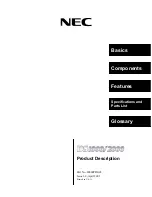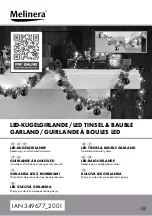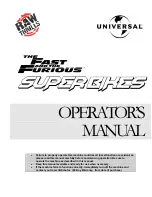
INSTRUCTIONS FOR
TOW POLE
MODEL NO:
TPK353
Thank you for purchasing a Sealey product. Manufactured to a high standard, this product will, if used according to these instructions,
and properly maintained, give you years of trouble free performance.
IMPORTANT:
PLEASE READ THESE INSTRUCTIONS CAREFULLY. NOTE THE SAFE OPERATIONAL REQUIREMENTS, WARNINGS & CAUTIONS. USE
THE PRODUCT CORRECTLY AND WITH CARE FOR THE PURPOSE FOR WHICH IT IS INTENDED. FAILURE TO DO SO MAY CAUSE DAMAGE AND/OR
PERSONAL INJURY AND WILL INVALIDATE THE WARRANTY. KEEP THESE INSTRUCTIONS SAFE FOR FUTURE USE.
1. SAFETY
9
Maintain the
tow pole in good condition. If the tow pole is damaged, remove from service.
9
Check vehicle manufacturer’s instructions to determine whether the vehicle is equipped with proper tow fittings suitable for use with a tow
pole. Also any special instructions for vehicles with automatic transmission or four wheel drive.
9
Use tow pole only on vehicles with standard tow eyes.
DO NOT
use transportation ‘tie down’ points.
9
Ensure the tow eyes, and the areas of the vehicles to which the eyes are fitted, are strong and solid enough for towing.
DO NOT
use the tow
pole if there is damage or heavy rust around the fitting area and ensure the eyes are approximately the same height from the ground.
9
Place an “ON TOW” notice in the back window or other visible location at the rear of the towed vehicle. Attach a red marker to the centre of the
tow pole.
9
The vehicle to be towed must be fully legal in respect of having the registration number visible at all times, must have a valid road tax,
insurance and relevant current MOT test certificate.
8
DO NOT
tow a vehicle that lacks one or more of these requirements.
9
Towed vehicle must have the ignition on in order to operate lights, brake lights and indicators. If these lights cannot be operated, you must fit
a repeater trailer board to towed vehicle. Contact your local Sealey dealer for information relating to approved towing boards which must
incorporate lighting and signalling equipment.
9
Ensure that the person in the towed vehicle is aware that, if servo brakes and/or power steering are fitted, then braking and/or steering
efforts will be very much higher than normal when the engine is not running.
9
Read vehicle manufacturers instructions before use.
8
DO NOT
exceed the rated capacity of the tow pole.
8
DO NOT
exceed a maximum towing speed of 15mph.
8
DO NOT
use the tow pole if damaged.
8
DO NOT
tow vehicle if the steering lock cannot be disengaged.
8
DO NOT
use the tow pole on a vehicle with defective braking system.
8
DO NOT
tow an unmanned vehicle.
8
DO NOT
force the tow pole to achieve a task it was not designed to perform.
8
DO NOT
allow untrained persons to use the tow pole.
8
DO NOT
operate the tow pole if any parts are missing as this may cause failure and possible personal injury.
2. INTRODUCTION
2.5 tonne rolling load capacity. Hook mechanism allows for mounting pole between vehicles where towing eyes may be mixed, i.e. not both
horizontal or vertical.
3. SPECIFICATION
Model no: .................................................................TPK353
Rolling load capacity: ............................... 2500kg (2.5 tonne)
Length: ........................................................................... 1.6m
4. TOWING INFORMATION
4.1.
Before towing a four wheel drive vehicle or a vehicle with automatic transmission it is essential to consult the manufacturer’s
handbook for the vehicle to be towed to check the correct towing procedure.
The correct procedure will vary from vehicle to vehicle
depending on the configuration of the transmission. (In some cases certain 4WD vehicles cannot be towed with all four wheels on the
ground and will have to be transported on a trailer). Failure to observe the correct procedure could result in severe damage to the vehicle’s
transmission
4.2. Many automatic transmissions require the engine to be active in order to drive a pump that provides lubrication to the transmission. If the
transmission is turned by the road wheels without the engine running, permanent damage could be done to the transmission due to lack of
lubrication. This could also apply to the secondary gearbox on a four wheel drive vehicle.
4.3. Four wheel drive systems are designed to run in tandem with the engine. If the engine is off but the transmission is driven at speed by the road
wheels the mismatch in speed between components within the gearboxes could also result in permanent damage to the transmission.
It is usually possible to tow four wheel drive vehicles with manual transmission as the engine can be disconnected from the primary gearbox.
Refer to
Instruction
Manual
TPK353 | Issue 3 (SP) 06/09/16
Original Language Version
© Jack Sealey Limited




















